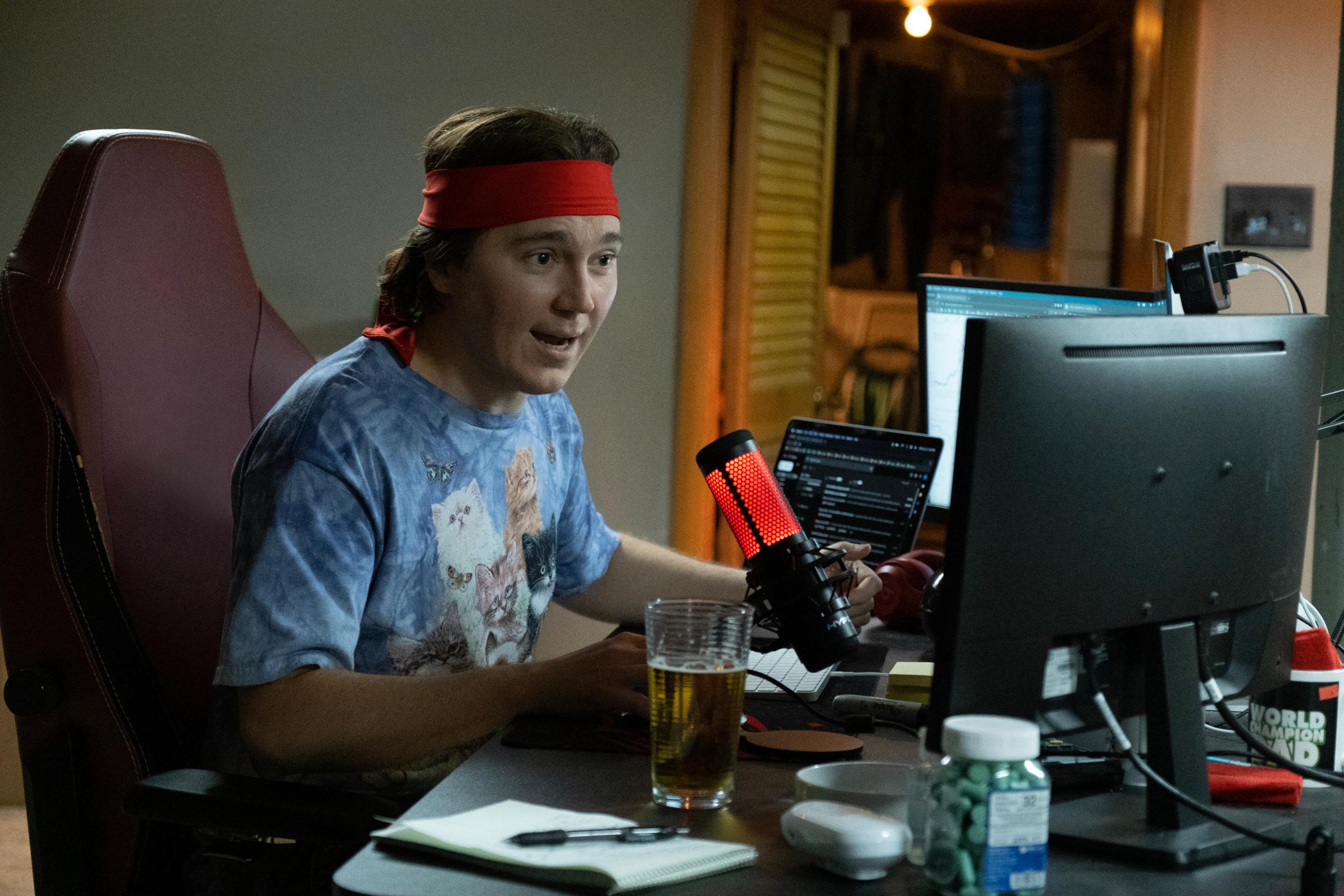Dumb Money dramatizes the true story behind working class Redditors turned investors who flipped Wall Street on its head. Currently out in limited theaters and expanding in the coming weeks, director Craig Gillespie’s comedy-drama, written by Lauren Schuker Blum and Rebecca Angelo, weaves together multiple storylines to bring to life the GameStop saga of 2021. That story, which dominated headlines while many were stuck at home during the days of the Omicron variant, has its roots in the practice by mega hedge funds to invest stock in companies like the gaming retailer, with the hopes for a short selling, an investment strategy that looks to profit from their falling stock prices. And those top dogs appear in Dumb Money, in the form of characters played by Nick Offerman, Seth Rogen, and Vincent D’Onofrio.
But the story really got interesting when working class investors banded together on the Reddit Internet forum r/WallStreetBets and short-squeezed the billionaire investors, causing a rapid rise in the stock’s price, thus leading to short sellers losing big. At its peak, GameStop stock traded at $483 per share. With these individual investors making an unprecedented impact on the market, the short sellers were offered several bailouts—leading to criticism that the system was rigged in their favor.
“I think it's very easy to look around and see how broken, fragmented, and seemingly hopeless things are,” Schuker Blum tells TIME. “But here was an inspiring story of an incredibly diverse and large group of people coming together around an idea.”
And that group of people—represented in the film by characters portrayed by Paul Dano, America Ferrera, and Anthony Ramos, among others—serve as the audience’s stand-in for the every-person. Some depict real-life characters, while others play fictional or composite characters based on the experiences of several investors.
During their research process, the filmmakers sourced a wealth of information from interviews with Reddit investor participants like Harmony Murphy (whom the movie character Harmony Williams was named for, but not directly based on, and who is currently in a pending lawsuit against Robinhood, the app that controversially froze trades on GameStop). They also used as source material Ben Mezrich’s 2021 book The Antisocial Network: The GameStop Short Squeeze and the Ragtag Group of Amateur Traders That Brought Wall Street to Its Knees. Mezrich was one of the executive producers on the film.
Here’s what to know about the real people behind the story.
Keith Gill

Keith Gill, played by Paul Dano, is central to the story, as the mastermind behind the stock takeover. Donning a red bandana and t-shirts with kittens on them in homage to his online username, “Roaring Kitty,” Gill is portrayed in the film as having gained a cult-like following from his fellow amateur, meme-friendly investors who connected with the videos he filmed from the basement of his Massachusetts home about his investments in GameStop.
Despite his strong online presence that secured nearly half a million subscribers on his YouTube channel, the film presents Gill’s life as normal, a financial analyst living with his wife and child in a modest suburban home, whose main hobby aside from investing is running.
Gill originally invested about $50,000 of his family's savings in GameStop, when its stock was going for about $5 a share. As he shared his strategy with his followers, who began to see the stock rise exponentially before their eyes, he was treated as a kind of folk hero.
In February 2021, Gill was called to testify about his role in the saga to Congress’ House Financial Services Committee. During the hearing, he stated, “My investment in GameStop and my posts on social media were entirely my own. I did not solicit anyone to buy or sell the stock for my own profit.”
It’s unclear how much Gill made from his GameStop investments, but at one point his investments reached $48 million in value. Gill has since maintained a private life out of the limelight.
The filmmakers reached out to Gill, but had no direct contact with him for the making of the film.
The hedge fund billionaires

Dumb Money also depicts the contributions of several hedge fund billionaires involved in the mayhem. For Mezrich’s book, the author spoke to dozens of high-level sources who are currently working or previously worked with key hedge funders in the story, as well as numerous billionaires who know them both professionally and socially. He reached out to additional hedge funders for the making of the film, but only got responses from a handful, according to a producer.
Rogen plays Gabe Plotkin, the CEO of Melvin Capital, the hedge fund whose GameStop shorting bets backfired. Offerman plays Kenneth Griffin, the founder of the hedge fund Citadel, which helped aid a $2 billion bailout to Plotkin and Melvin Capital. (Puck News reported that Griffin is in a legal fight over his depiction in the film. In a CNBC Leaders interview on Sept. 18, Griffin refuted the claim, saying "I have other things to do with my life" and joking lightheartedly in response to a question about the filmmakers casting Offerman to play him: "If I could get Daniel Craig, you know, I’d prefer that. But, you know, Nick works great.") D'Onofrio, meanwhile, depicts Steve Cohen, the founder of hedge fund Point72 and owner of the New York Mets, which, similar to Citadel’s fund, invested $750,000 in Melvin Capital during the GameStop stock surge.
Sebastian Stan and Rushi Kota play Vlad Tenev and Baiju Bhatt, respectively, the co-founders of financial services company Robinhood, which offers “commission-free trades of stocks, options, ETFs, and cryptocurrencies.” A primary platform where individual investors were purchasing and selling Gamestop stock, Robinhood became mired in controversy when the co-founders decided to freeze trading for GameStop on Jan. 28, 2021. The movie depicts the co-founders as being in the pockets of the hedge fund managers, despite their avowed mission to democratize access to trading. At the time, Barron’s reported that the company’s explanation that it “needed to restrict trading in those stocks until it could increase its collateral with the Depository Trust & Clearing Corporation” was legitimate; regardless of the true motivation, the move was met with widespread criticism from everyday investors.
Angelo stresses that she and Schuker Blum did not set out to vilify any one of these men on their own. “The villain of the film isn’t one individual, it’s a system that clearly has no transparency,” she says.
As for where things stand now: Melvin Capital faced several lawsuits and shut down in 2022; Cohen still owns the Mets; and Robinhood reached a settlement in a class-action lawsuit after the congressional investigation concluded that “Robinhood exhibited troubling business practices, inadequate risk management, and a culture that prioritized growth above stability during the meme stock market event.”
The working-class Redditors turned investors
This stock saga could not be told without the contributions of thousands of investors who made the historic moment possible. In Dumb Money, their hopes, dreams, and solidarity provide the movie’s heart and key narrative tension.
The film chooses to highlight these investors within four primary characters–Riri and Harmony (played by Myha'la Herrold and Talia Ryder, respectively), a college-aged duo saddled with debt; Ramos’ Marcus Barcia, a retail investor who works at a physical GameStop store; and Ferrera’s Jennifer Campbell, a single mother working as a nurse during the pandemic.
The inspiration for Ferrera’s character was a woman named Kim Campbell, who like the character was a single mother and RN who took an interest in the r/WallStreetBets page as a source of both financial advice and entertainment. “The stock market is not just for people in suits, it's all sorts of people doing it,” Campbell tells TIME of her own interest in trading.
When Gill’s movement took off, Campbell wanted in and purchased 100 shares of GameStop. “I thought, ‘This is going to happen, I can’t be the one that didn’t buy any,’” she says. “If they were going to the moon, I wanted to go too.”
Campbell only sold five of those shares, making more from that sale than she spent on the investment of the 100. She still holds the remaining shares. Dumb Money depicts solidarity among characters like Campbell and Barcia, who didn’t know each other personally but felt that they were in this together, with a remarkable number of them holding out from selling shares to ensure they could stick it to the hedge funds above their own personal profits. “While it was going on, I did almost feel a little like I had a chance to win,” she says. “I thought, ‘I want the money,’ but then it grew into representing so much more.”
Campbell was alarmed when Robinhood removed the “Buy” button on the app. “I already knew things were rigged, but that was really unfair. It felt like they changed the rules of the game.”
And this gets at the heart of the film: With their depiction of how much power is consolidated within the one percent, the filmmakers hope viewers will walk away inspired by the sheer impact that a group of average Joes still indisputably made–especially considering how their work prompted larger conversations about the trading industry in government and beyond. “We want people to walk out of the theater feeling a little bit more optimistic than they are pessimistic,” says Angelo. “We are not under any illusion that the system is permanently changed by this story, but this is one example of the power of the collective to come together and match a meaningful victory.”
More Must-Reads from TIME
- Caitlin Clark Is TIME's 2024 Athlete of the Year
- Where Trump 2.0 Will Differ From 1.0
- Is Intermittent Fasting Good or Bad for You?
- The 100 Must-Read Books of 2024
- Column: If Optimism Feels Ridiculous Now, Try Hope
- The Future of Climate Action Is Trade Policy
- FX’s Say Nothing Is the Must-Watch Political Thriller of 2024
- Merle Bombardieri Is Helping People Make the Baby Decision
Write to Mariah Espada at mariah.espada@time.com